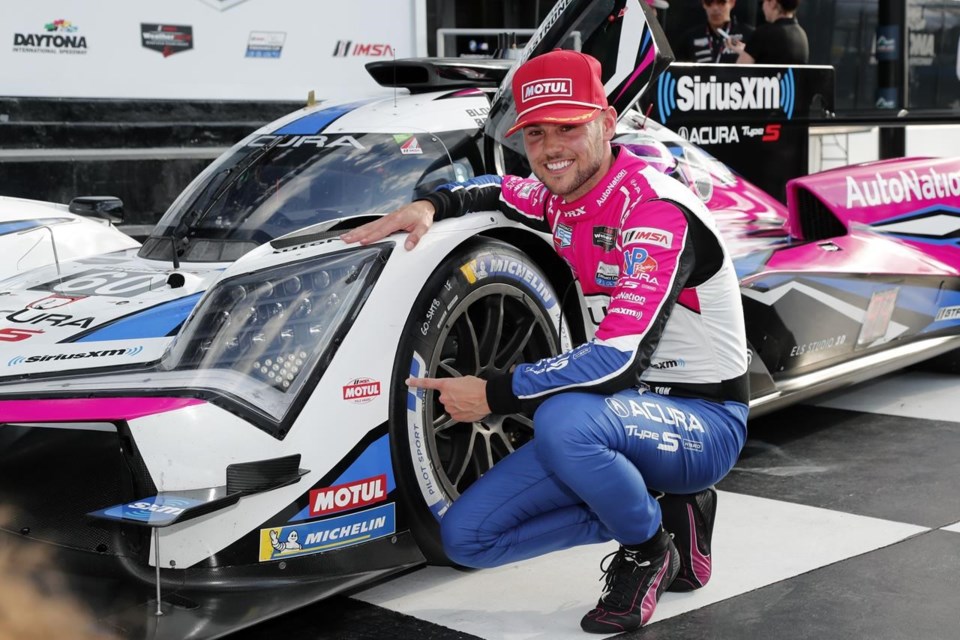DAYTONA BEACH, Fla. (AP) — The Cadillac growls, while the Porsche and BMW scream. The Acura sounds like an Indy car, and for fun, turn your back to the track and listen carefully as the cars roar around Daytona International Speedway in a new era of IMSA sports car racing.
The top prototype class has switched to hybrid engines this year to make IMSA the first North American racing series to make the technology upgrade. It was the automakers that wanted to move to hybrid so that their motorsports programs would reflect the direction most have taken for their road cars.
“We are in the transformation, or transition, into the electric world,” said Andreas Roos, head of BMW M Motorsport. “This is the perfect fit to be in parallel between our road car development and our racing. It's very important that we have a road-car relevance and this is a perfect match.”
The cars make their debut Saturday in the twice-round-the-clock Rolex 24 at Daytona, which has been described as a "symphony of sounds" because of the new engines. The hybrid powertrains marry a traditional internal combustion engine with Bosch’s Motor Generation Unit, an energy recovery system that includes batteries and an Xtrac gearbox.
One of the major concerns headed into this new era was that the hybrid technology would rob the cars of the loud roar that is part of motorsports' allure. But the opposite has happened as the four manufacturers in GTP — double the number from last year — created engines with distinctive sounds. BMW and Porsche both moved up classes to be part of the endeavor, and Lamborghini has announced plans to enter the series.
“The thing I like about the hybrid system versus strictly (electric) is we still have a nice sound, and I think that's very important. They all sound good, like an orchestra playing out there,” said NASCAR chairman Jim France, who also owns IMSA. “I think the formula that we have is going to be very important for motorsports.”
The new rules package also makes IMSA's top GTP class eligible to race at the 24 Hours of Le Mans as early as this year. Acura and BMW have already said they won't be ready for Le Mans this year.
The changes have also lured Roger Penske back to sports car racing. Rahal Letterman Lanigan moved its BMW program up to IMSA's top class, and Michael Andretti last month partnered with Wayne Taylor Racing to get Andretti Autosport onto the grid.
The excitement has Daytona officials predicting the largest crowd in at least a decade for the 61st running of North America's most prestigious endurance race.
But getting to Saturday's debut has been a challenge as the manufacturers have battled supply—chain crises and a compressed timeline to launch an entirely new program.
“It’s been a huge undertaking,” said Mike O’Gara, the director of operations for Chip Ganassi Racing's two-car Cadillac program. “In the 30-year history of Chip Ganassi Racing, we’ve been fortunate to be part of a lot of different vehicle launches. This one is by far the most intense, the most complex and, honestly, the most exciting for the company. The timelines we’ve been holding to have been difficult with supply-chain issues, trying to put adequate miles on the cars to be ready and the level of complexity of the cars with the hybrid system and the other control systems."
Teams had 18 months from when the rules package was set to build their cars and engines, but only 17 weeks from the conclusion of last season to finalize their entries for the biggest race of the IMSA season.
The Porsche program, which has partnered with Roger Penske for his return to sports car racing and chance to win Le Mans, did the early testing of the single-source hybrid system.
“Everything is new. So that comes with new challenges — you need enough parts to assemble a reasonable amount of race cars at a reasonable quality,” said David Salters, president of Honda Performance Development. “When every single component is new, the effort is daunting, really. But that’s why we do it. That’s why we torture ourselves and that’s why we love it.
“The easy thing would have been just to have lifted (last year’s) engine and plunk it in, but that’s not why we do this. We just started with a clean sheet of paper and said, ‘What do we need to make the best racing car?’”
And now that the cars have made it to Daytona and are ready to race, there are significant concerns about their durability over a 24-hour race. So much concern that multiple second-class LMP2 teams believe they've got a shot at the overall win because the prototypes won't be able to finish the race.
Meyer Shank Racing, both the defending race winner and IMSA champion, starts from the pole but is so concerned about the durability of the Acura for the full race that it skipped Friday night's final practice. The MSR lineup includes four-time Indianapolis 500 winner Helio Castroneves, who has won two consecutive Rolex 24s.
There have been reports that the two Acura programs of Shank and Andretti/Taylor have yet to complete a 24-hour test.
___
AP auto racing: https://apnews.com/hub/auto-racing and https://twitter.com/AP_Sports
Jenna Fryer, The Associated Press



